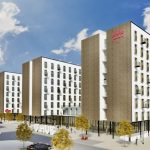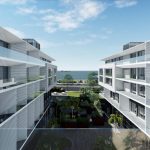Shelved plans for new Lisbon metropolis dusted down
Plans to develop a mega Lisbon urban metropolis around the Sporting football stadium at Alvalade will finally be built years after being shelved.
In January this year, Norfin announced that it would invest €200 million in building the “Metropolis” project — a surprise since Norfin is a property management company which rarely makes investments.
The land was in fact sold by Blackstone (Multi) via agents JJL for €70 million to the US capital management company King Street Capital Management which also owns Palmares Ocean Living & Golf Resort and Amendoeira Golf Resort in the Algarve and which will invest a majority share in the new project.
A smaller share will be invested by Arrow Global Group and Norfin.
The original master plan for a new Lisbon neighbourhood including shops, offices, apartments and green areas had been devised in 2004 after Portugal won the tender to host the UEFA Euro 2004 football championships.
The land on which the new neighbourhood was to have been built on is now empty but the project has been taken off the shelf and dusted down thanks to US investors.
The original project harks back to 2002 when the old Sporting Football Club stadium was being demolished to make way for a mega-project. The project for the new football stadium went ahead at pace and the new José Alvalade Stadium was inaugurated in August 2003 with a capacity to hold 50,000 fans in a stadium involving a €180 million investment — €80 million over budget.
With the new Sporting stadium ready to house Sporting Football Club and host the games for the 2004 UEFA Cup, the plans for the new vacant plot of land left from the demolition of the old stadium began to take shape.
The site and project got outline planning permission and was then sold in January 2008 for €60 million to the Dutch developer Multi Development Corporation (Multi) which was also responsible for building Almada Forum and the Lisbon shopping centre Armazéns do Chiado.
But according to a real estate management audit conducted for Sporting, the project was seen as prejudicial to the club and the plots of land were sold off for prices well below market value.
In the years that followed, particularly those marked by the downturn in Portugal’s construction industry from 2007, followed by the economic crisis from 2008, development projects for the land were shelved.
However, in 2011, the year in which Portugal asked for a financial bailout of €78Bn from the IMF/ECB/EC ‘troika’ of international lenders, Multi officially laid the first stone for the ‘Metropolis Project’ with the building of a 14,600 m2 office building, today occupied by the telecoms company Nos.
The initial Multi project foresaw two buildings but ended up by being completely redesign to meet the needs of Nos.
In 2013 Multi was purchased by Blackstone right in the tail end of the economic crisis but at a time when the worst seemed to be over.
Gonçalo Santos, Head of Development for JLL on behalf of Multi explained that the sale process for Metropolis was “highly competed for with the asset being fought over by various national and international players”.
“The interest that this asset has generated only confirms the willingness of big investors to invest in large-scale new build projects.”
Work on “Metropolis” will begin at the end of the year and will cover an area of 80,000 m2 spread over four office buildings (37,600 m2), three apartment buildings (30,250 m2) with 200 apartments, plus a shopping area covering 11,100 m2.
André David Nunes, CIO of Arrow Portugal believes that this project will “meet much of the huge demand for premium offices which are currently concentrated in the Parque das Nações.”










